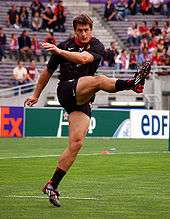Stade Toulousain
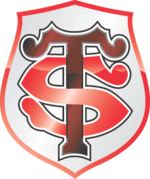 | ||||
| Full name | Stade Toulousain | |||
|---|---|---|---|---|
| Founded | 1907 | |||
| Location | Toulouse, France | |||
| Ground(s) | Stade Ernest-Wallon (Capacity: 19,500) | |||
| President | Jean-René Bouscatel | |||
| Coach(es) | Ugo Mola | |||
| Captain(s) | Thierry Dusautoir | |||
| League(s) | Top 14 | |||
| 2015–16 | 5th (playoff quarter-finalists) | |||
| ||||
| Official website | ||||
|
www | ||||
Stade Toulousain (French pronunciation: [stad tuluzɛ̃]) (Occitan: Estadi Tolosenc), also referred to as Toulouse, is a French rugby union club from Toulouse in Occitania. Toulouse is arguably one of the finest rugby clubs in the world and the most successful in Europe, having won the Heineken Cup a record four times – in 1996, 2003, 2005 and 2010. They were also runners-up in 2004 and 2008 against London Wasps and Munster, respectively. Stade Toulousain have also won a record 19 French Championship titles. It is traditionally one of the main providers for the French national team. Their home ground is the Stade Ernest-Wallon. However, big Top 14 matches along with Heineken Cup games are often played at the Stadium Municipal de Toulouse. The club colours are red, black and white.
History
Foundation
Before 1907 rugby in Toulouse was only played in schools or universities. In 1893, students of secondary school "Lycée de Toulouse" got together in "les Sans Soucis". Once attending university the same students founded "l'Olympique Toulousain", which became "Stade Olympien des Etudiants de Toulouse" (SOET) a few years later in 1896. In the same period, 'non-students' grouped in "le Sport Atléthique Toulousain" (SAT) while students of the veterinary school created "l'Union Sportive de l'Ecole Vétérinaire" (USEV). Both entities merged in 1905 and called themselves "Véto-Sport". Finally in 1907, Stade Toulousain was founded resulting from a union between the SOET and Véto-Sport.
Early years

Stade Toulousain played its first final of the national title French Championship in 1909 and lost it to Stade Bordelais Université Club (17–0) in Toulouse. In 1912 Stade Toulousain won its first national title. It had to wait until 1922 before it won its second. However the 1920s were a golden era for the club. Their first final action in the 1920s was in 1921, when they were defeated by USA Perpignan. Despite losing in 1921, the side went on to win the 1922, 1923, 1924, 1926 and 1927 championships.
1930s to 1950s
The following decades were relatively quiet after such a dominant era during the 1920s. Stade Toulousain would not make it to any grand finals during the 1930s, and it would not be until the late 1940s when they would return. However they did contest the Challenge Yves du Manoir with RC Toulon in 1934, though it ended in a nil-all tie and both teams were winners. The club made it to the final of the 1947 championship, and claimed the premiership, beating SU Agen, 10 to 3. However, no such championships followed, the club was again relatively quiet on the championship. It was 22 years in the waiting; Toulouse made it to the final, but were defeated by the CA Bègles club.
1970s to 1980s
In 1971 Toulouse contested the Challenge Yves du Manoir against US Dax, losing 18 to 8. Eleven years after the CA Bègles defeat, the club was again disappointed in the final, being defeated by AS Béziers in the championship game of 1980. The latter end of the decade was however, reminiscent of the 1920s sides. Toulouse were again contesting the Challenge Yves du Manoir for the 1984 season, though they lost to RC Narbonne 17 to 3. They did however claim their first championship since 1947, defeating RC Toulon in the 1985 final. The following season saw them successfully defend their championship, defeating SU Agen in the final. After a number of defeats in the Challenge Yves du Manoir finals, Toulouse defeated US Dax to win the 1988 competition. Both Toulon and Agen won the following premierships (1987 and 1988) but Toulouse won another championship in 1989.
1990s to present
The dominance continued in the 1990s, starting with a grand final loss in 1991, and a Challenge Yves du Manoir championship in 1993, defeating Castres 13 to 8 in the final. The mid-1990s saw Stade Toulousain become a major force yet again, as the club claimed four premierships in a row, winning the championship in 1994, 1995, 1996 and 1997, as well as the Challenge Yves du Manoir in 1995. The club emmulated its success in the European Rugby Cup, becoming the first ever champions in the 1995–96 season.
The late 1990s and the 2000s saw the club again reach great heights. The club won the Challenge Yves du Manoir in 1998, defeating Stade Français Paris, and the 1999 championship as well as the 2001 championship and were runners-up in the 2003 season, losing to Stade Français in the final. As the club had done in the mid-1990s, Stade Toulousain replicated this success in the European Rugby Cup, winning the 2002–03 championship and the 2004–05 championship. The club made it to the final of the 2005–06 Top 14, and despite only trailing Biarritz 9–6 at half time, Toulouse could not prevent a second-half whitewash, eventually going down 40–13. They ended their seven-year title drought with a 26–20 win over ASM Clermont Auvergne on 28 June 2008. In 2008 they narrowly lost a Heineken Cup Final to Munster by 3 points. In 2010 Toulouse defeated Leinster to reach the final where they faced Biarritz Olympique at Stade de France in Paris on Saturday 22 May 2010. Toulouse won the game by 21–19 to claim their fourth Heineken Cup title,[1][2] making them the only club to ever win the title four times. Stade Toulousain is also the only French club to have taken part in all the editions of Heineken Cup since its creation (17, with the 2011–12 season). They won the French championship in 2011 against Montpellier (15–10) and 2012 against Toulon (18–12). Stade Toulousain reached the semi-finals of the French championship 20 consecutive years (from 1994 to 2013).
Stadium

Toulouse play their home games at the Stade Ernest-Wallon, which was built in the late 1980s and was recently renovated. Stade Toulousain is one of the three teams (all sports included) that own its stadium. It has a capacity of 19,500. The stadium however cannot always accommodate all the fans of the Toulouse club. For the larger fixtures, such as championship or Heineken Cup games or play-offs, the fixture may be moved to Stadium Municipal, which has double capacity, 38,000. The stadium has been used for numerous matches at the 2007 Rugby World Cup
Honours
Rugby Union
- World Club Championship:
- Champions: 1986, 1990
- Heineken Cup:
- French Champions:
- Coupe de l'Espérance:
- Champions: 1916
- Runners-up: 1917
- Challenge Yves du Manoir:
- Champions: 1934, 1988, 1993, 1995, 1998
- Runners-up: 1971 1984
- French Cup:
- Champions: 1946, 1947, 1984
- Runners-up: 1949, 1985
Football
- Champions of Midi:
- Champions: 1905, 1906, 1907, 1908, 1909, 1910, 1911, 1912, 1913, 1914
European record
Toulouse qualified for the Heineken Cup in every season of that competition's existence (1995–96 to 2013–14), and played in the inaugural season of the replacement competition, the European Rugby Champions Cup. The club had the best competition record in the Heineken Cup, having won the competition four times.
| Season | Competition | Games | Points | Notes | |||||
|---|---|---|---|---|---|---|---|---|---|
| played | won | drawn | lost | for | against | difference | |||
| 2015–16 | European Rugby Champions Cup | 6 | 1 | 0 | 5 | ||||
| 2014–15 | European Rugby Champions Cup | 6 | 4 | 0 | 2 | 126 | 124 | +2 | Failed to exit group stages from Pool 4. |
| 2013–14 | Heineken Cup | 7 | 5 | 0 | 2 | 166 | 110 | 56 | Quarter-finalists (lost to Munster) |
| 2012–13 | Heineken Cup | 6 | 4 | 0 | 2 | 132 | 84 | 48 | Second place in Pool 2; parachuted into European Challenge Cup |
| European Challenge Cup | 1 | 0 | 0 | 1 | 19 | 30 | −11 | Quarter-finalists (lost to Perpignan) | |
| 2011–12 | Heineken Cup | 7 | 4 | 0 | 3 | 164 | 124 | 40 | Quarter-finalists (lost to Edinburgh) |
| 2010–11 | Heineken Cup | 8 | 6 | 0 | 2 | 205 | 137 | 68 | Semi-finalists (lost to Leinster) |
| 2009–10 | Heineken Cup | 9 | 8 | 0 | 1 | 232 | 143 | 89 | Champions (defeated Biarritz Olympique) |
| 2008–09 | Heineken Cup | 7 | 4 | 1 | 2 | 127 | 97 | 30 | Quarter-finalists (lost to Cardiff Blues) |
| 2007–08 | Heineken Cup | 9 | 6 | 0 | 3 | 210 | 119 | 91 | Runners-up (lost to Munster) |
| 2006–07 | Heineken Cup | 6 | 3 | 0 | 3 | 147 | 145 | 2 | Failed to exit group stages from Pool 5. |
| 2005–06 | Heineken Cup | 7 | 5 | 1 | 1 | 223 | 165 | 58 | Quarter-finalists (lost to Leinster) |
| 2004–05 | Heineken Cup | 9 | 8 | 0 | 1 | 263 | 144 | 119 | Champions (defeated Stade Français) |
| 2003–04 | Heineken Cup | 9 | 7 | 0 | 2 | 232 | 113 | 119 | Runners-up (lost to Wasps) |
| 2002–03 | Heineken Cup | 9 | 8 | 0 | 1 | 308 | 163 | 145 | Champions (defeated Perpignan) |
| 2001–02 | Heineken Cup | 6 | 3 | 0 | 3 | 151 | 146 | 5 | Failed to exit group stages from Pool 6. |
| 2000–01 | Heineken Cup | 6 | 2 | 1 | 3 | 171 | 182 | −11 | Failed to exit group stages from Pool 3. |
| 1999–00 | Heineken Cup | 8 | 6 | 0 | 2 | 256 | 122 | 134 | Semi-finalists (lost to Munster) |
| 1998–99 | Heineken Cup | 7 | 4 | 0 | 3 | 247 | 118 | 129 | Quarter-finalists (lost to Ulster) |
| 1997–98 | Heineken Cup | 8 | 6 | 1 | 1 | 273 | 153 | 120 | Semi-finalists (lost to Brive) |
| 1996–97 | Heineken Cup | 6 | 4 | 0 | 2 | 194 | 197 | −3 | Semi-finalists (lost to Leicester Tigers) |
| 1995–96 | Heineken Cup | 4 | 4 | 0 | 0 | 123 | 40 | 83 | Champions (defeated Cardiff) |
Current standings
| |||||||||||||||||
| Club | Played | Won | Drawn | Lost | Points For | Points Against | Points Diff. | Tries For | Tries Against | Try Bonus | Losing Bonus | Points | |||||
|---|---|---|---|---|---|---|---|---|---|---|---|---|---|---|---|---|---|
| 1 | Clermont | 13 | 8 | 2 | 3 | 378 | 286 | +92 | 38 | 29 | 3 | 2 | 41 | ||||
| 2 | Montpellier | 13 | 8 | 0 | 5 | 318 | 253 | +65 | 26 | 21 | 3 | 2 | 37 | ||||
| 3 | La Rochelle | 13 | 6 | 3 | 4 | 312 | 265 | +47 | 30 | 19 | 3 | 3 | 36 | ||||
| 4 | Toulon | 13 | 7 | 1 | 5 | 336 | 266 | +90 | 32 | 25 | 4 | 2 | 36 | ||||
| 5 | Bordeaux | 13 | 8 | 0 | 5 | 316 | 297 | +19 | 27 | 26 | 1 | 1 | 34 | ||||
| 6 | Castres | 13 | 7 | 1 | 5 | 335 | 259 | +76 | 29 | 18 | 2 | 2 | 34 | ||||
| 7 | Toulouse | 13 | 7 | 0 | 6 | 272 | 252 | +20 | 25 | 18 | 2 | 3 | 33 | ||||
| 8 | Racing | 13 | 7 | 1 | 5 | 291 | 285 | +6 | 29 | 24 | 2 | 0 | 32 | ||||
| 9 | Stade Français | 13 | 6 | 1 | 6 | 338 | 313 | +25 | 33 | 26 | 2 | 1 | 29 | ||||
| 10 | Brive | 13 | 6 | 1 | 6 | 288 | 341 | –53 | 19 | 31 | 0 | 1 | 27 | ||||
| 11 | Pau | 13 | 5 | 0 | 8 | 296 | 342 | –46 | 27 | 31 | 1 | 4 | 25 | ||||
| 12 | Lyon | 13 | 4 | 2 | 7 | 263 | 298 | –35 | 19 | 23 | 1 | 3 | 24 | ||||
| 13 | Bayonne | 13 | 3 | 2 | 8 | 188 | 341 | –153 | 11 | 33 | 0 | 0 | 16 | ||||
| 14 | Grenoble | 13 | 2 | 0 | 11 | 297 | 430 | –193 | 28 | 40 | 1 | 5 | 14 | ||||
|
If teams are level at any stage, tiebreakers are applied in the following order:
| |||||||||||||||||
| Green background (rows 1 and 2) receive semi-final play-off places and receive berths in the 2017–18 European Rugby Champions Cup. Blue background (rows 3 to 6) receive quarter-final play-off places, and receive berths in the Champions Cup. Yellow background (row 7) advances to a play-off for a chance to compete in the Champions Cup. Plain background indicates teams that earn a place in the 2017–18 European Rugby Challenge Cup. Red background (row 13 and 14) will be relegated to Rugby Pro D2. Final table | |||||||||||||||||
Current squad
2016–17 Note: Flags indicate national union as has been defined under WR eligibility rules. Players may hold more than one non-WR nationality.
Selected former coaches
 Tom Richards
Tom Richards François Borde
François Borde Robert Barran
Robert Barran Paul Blanc
Paul Blanc Claude Labatut
Claude Labatut Robert Bru
Robert Bru Pierre Villepreux & Jean-Claude Skrela
Pierre Villepreux & Jean-Claude Skrela Guy Novès
Guy Novès
Notable former players
-
 Omar Hasan
Omar Hasan -
 Nicolás Vergallo
Nicolás Vergallo -
 Alberto Vernet Basualdo
Alberto Vernet Basualdo -
 Luke Burgess
Luke Burgess -
 Tom Richards
Tom Richards -
 Rob Andrew
Rob Andrew -
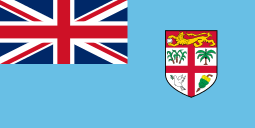 Rupeni Caucaunibuca
Rupeni Caucaunibuca -
 Vilimoni Delasau
Vilimoni Delasau -
 Maleli Kunavore
Maleli Kunavore -
 Timoci Matanavou
Timoci Matanavou -
 Akapusi Qera
Akapusi Qera -
 David Aucagne
David Aucagne -
 Benoît Baby
Benoît Baby -
 Jean Bayard
Jean Bayard -
 Lionel Beauxis
Lionel Beauxis -
 Franck Belot
Franck Belot -
 Nicolas Bézy
Nicolas Bézy -
 Alexandre Bioussa
Alexandre Bioussa -
 Eric Bonneval
Eric Bonneval -
 Jean Bouilhou
Jean Bouilhou -
 François Borde
François Borde -
 Guillaume Boussès
Guillaume Boussès -
 Yannick Bru
Yannick Bru -
 Jean-Marie Cadieu
Jean-Marie Cadieu -
 Christian Califano
Christian Califano -
 Philippe Carbonneau
Philippe Carbonneau -
 Thomas Castaignède
Thomas Castaignède -
 Richard Castel
Richard Castel -
 Jérôme Cazalbou
Jérôme Cazalbou -
 Denis Charvet
Denis Charvet -
 André Chilo
André Chilo -
 Albert Cigagna
Albert Cigagna -
 Vincent Clerc
Vincent Clerc -
 Didier Codorniou
Didier Codorniou -
 Patrice Collazo
Patrice Collazo -
 Cédric Desbrosse
Cédric Desbrosse -
 Yann Delaigue
Yann Delaigue -
 Christophe Deylaud
Christophe Deylaud -
 Yves Donguy
Yves Donguy -
 Sylvain Dupuy
Sylvain Dupuy -
 Jean-Baptiste Élissalde
Jean-Baptiste Élissalde -
 Jean Fabre
Jean Fabre -
 Jerome Fillol
Jerome Fillol -
 Henri Galau
Henri Galau -
 Xavier Garbajosa
Xavier Garbajosa -
 David Gérard
David Gérard -
 Imanol Harinordoquy
Imanol Harinordoquy -
 Dominique Harize
Dominique Harize -
 Cédric Heymans
Cédric Heymans -
 Adolphe Jauréguy
Adolphe Jauréguy -
 Yannick Jauzion
Yannick Jauzion -
 Nicolas Jeanjean
Nicolas Jeanjean -
 Christian Labit
Christian Labit -
 Virgile Lacombe
Virgile Lacombe -
 Serge Lairle
Serge Lairle -
 Benoît Lecouls
Benoît Lecouls -
 Julien Le Devedec
Julien Le Devedec -
 Matthieu Lièvremont
Matthieu Lièvremont -
 Marcel-Frédéric Lubin-Lebrère
Marcel-Frédéric Lubin-Lebrère -
 Gérald Martinez
Gérald Martinez -
 Alfred Mayssonnié
Alfred Mayssonnié -
 Maxime Mermoz
Maxime Mermoz -
 Frédéric Michalak
Frédéric Michalak -
 Romain Millo-Chluski
Romain Millo-Chluski -
 Hugues Miorin
Hugues Miorin -
 Ugo Mola
Ugo Mola -
 Sylvain Nicolas
Sylvain Nicolas -
 Guy Novès
Guy Novès -
 Émile Ntamack
Émile Ntamack -
 Yannick Nyanga
Yannick Nyanga -
 Fabien Pelous
Fabien Pelous -
 Alain Penaud
Alain Penaud -
 Louis Picamoles
Louis Picamoles -
 Clément Poitrenaud
Clément Poitrenaud -
 Jean-Baptiste Poux
Jean-Baptiste Poux -
 Jean-Pierre Rives
Jean-Pierre Rives -
 Philippe Rougé-Thomas
Philippe Rougé-Thomas -
 Daniel Santamans
Daniel Santamans -
 William Servat
William Servat -
 David Skrela
David Skrela -
 Jean-Claude Skrela
Jean-Claude Skrela -
 Cédric Soulette
Cédric Soulette -
 Nicolas Spanghero
Nicolas Spanghero -
 Walter Spanghero
Walter Spanghero -
 Philippe Struxiano
Philippe Struxiano -
 Franck Tournaire
Franck Tournaire -
 Pierre Villepreux
Pierre Villepreux -
 Jaba Bregvadze
Jaba Bregvadze -
 Andrea Lo Cicero
Andrea Lo Cicero -
 Salvatore Perugini
Salvatore Perugini -
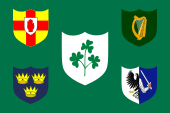 Trevor Brennan
Trevor Brennan -
 Corey Flynn
Corey Flynn -
 Hosea Gear
Hosea Gear -
 Byron Kelleher
Byron Kelleher -
 Isitolo Maka
Isitolo Maka -
 Lee Stensness
Lee Stensness -
 Neemia Tialata
Neemia Tialata -
 Gaffie du Toit
Gaffie du Toit -
 Gary Botha
Gary Botha -
 Daan Human
Daan Human -
 Shaun Sowerby
Shaun Sowerby -
 Jano Vermaak
Jano Vermaak -
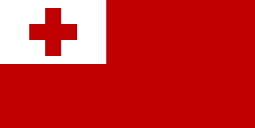 Finau Maka
Finau Maka -
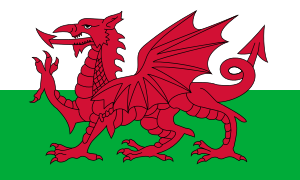 Gareth Thomas
Gareth Thomas
Presidents
- Henri Cazaux : 1954–57
- André Brouat : 1964–66
- Henri Fourès : 1966–73
- Henri Cazaux : 1974–80
- Jean Fabre : 1980–89
- Jean-René Bouscatel : 1992–
Fans
- Le Huit (fan club of Stade toulousain)
- Le Huit Section Aveyron
- Le Rouge et le Noir (formerly Les ultras), the oldest fan club.
- Le 16e homme
- Le 16e homme Toulousains 2 Paris (Stade Toulousain's supporters Club at Paris)
- L'amicale des Supporters
- Le Virage Toulousain
- Tolosa XV
- Les Rouge et Noir de Picardie
See also
References
- ↑ Cleary, Mick (22 May 2010). "Toulouse lead French revolution with Heineken Cup final win against Biarritz". The Daily Telegraph. London. Retrieved 24 May 2010.
- ↑ "Biarritz 19–21 Toulouse: As it happened". RTÉ Sport. Raidió Teilifís Éireann. 22 May 2010. Retrieved 24 May 2010.
External links
- (French) Stade Toulousain Official website
- Data, Results etc on ITS Rugby
